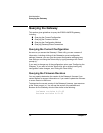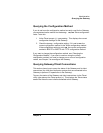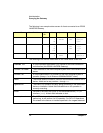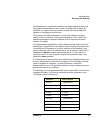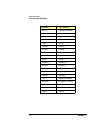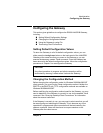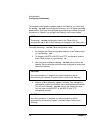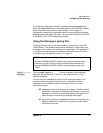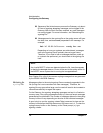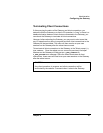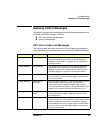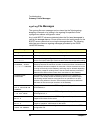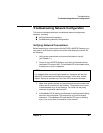
78 Chapter 4
Administration
Configuring the Gateway
n Because of the limited memory area on the Gateway, only about
50 lines of syslog-display messages can be logged in the
Gateway. After the limit has been reached, any new messages
can not be logged. For more information, see “Maintaining the
syslog File”.
n Messages sent to the syslog file on the syslog server will have
the date, time, and hostname prepended to the message. For
example:
Feb 16 13:51:06 hostname: ready for use
Depending on how your systems are administered, messages
sent to the syslog file will probably have a longer history.
Therefore, if you need to look at messages before a power-on
or a reboot was performed, you should look at the syslog file
itself.
See Chapter 5 for a list of the common syslog messages that are generated
by the E2050 LAN/GPIB Gateway.
Maintaining the
syslog File
Messages written to the actual syslog file are constantly appended to the
file (the log file is not overwritten with new messages). Therefore, the
syslog file may grow rather large over time and will need to be truncated or
removed occasionally to regain disk space.
On the Gateway, the syslog-display messages are kept in a fixed-size
memory area. If the syslog message area fills up, the most recent messages
generated will be discarded. The number of messages allowed in the syslog
memory buffer will vary depending on the size of the individual messages.
A good rule is to use the syslog-clear Telnet command to clear out the
memory buffer before the buffer has around 50 lines or so in it. To clear the
syslog memory buffer on the Gateway, at the Telnet prompt (>), type
syslog-clear
NOTE
Any invalid BOOTP values are detected when the file /etc/bootptab
is read by the bootpd daemon. Errors will be sent to the syslog server for
the BOOTP server system that is running the bootpd daemon.



